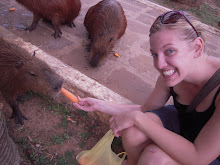5-13-09
Part 1.
So not only are schools closed Thursday and Friday for the holidays but in Central (my department or state) almost all the teachers are striking, which means kids only had class on Monday. The teachers are striking for the usual things people strike for--wages and rights. In Paraguay there is a minimum wage, but since very few people except (beginning only very recently) government employees receive it, it seems like a bit of a misnomer. Assuming the numbers my host brother gave me are correct, minimum wage comes out to about $280 a month or $3360 a year. I´m not sure how much the teachers are making. There are three shifts of classes in a school day: morning (7am-11/noon), afternoon (1pm-5pm) and night (5pm-9pm). Most teachers I´ve met teach in at least two of those shifts, if not all three. That being said, the schedules do rotate so they wouldn´t be teaching every hour of the day. All kids here wear uniforms, though those uniforms are frequently open to individual interpretation at the poorer schools.
Moving on with this number game, I believe I make about minimum wage. It is enough for me to live comfortably and simply, though I´m obviously only supporting myself. I pay my host family rent which ends up being 200,000 Guaranís or $40 a month. They also feed me most of my meals. I buy some groceries and eat a great deal of lunches at the community center and the community kitchen. (These meals are usually rice or pasta based with some meat or corn ball (vorri vorri), and the infrequent vegetable.) Breakfast consists of cafe con leche and white dinner rolls. Dinner could be anything--left overs from lunch, yogurt and alfahors (sweet bread), salad. In between breakfast and lunch if I¨m at the community center I´m given bananas or empanadas before wonderful refreshing terere. I don´t know if I´ve mentioned this before. I am not sure how that would be possible. Terere is such a huge part of Paraguayan culture. Everyone has a thermos filled with cold water and herbs (lemon grass, limon, and mint are my favorites) if it is morning. Supposedly having yuyos (herbs) in your terere in the afternoon will make you sick. (Also, supposedly if you mix terere and watermelon it will explode in your stomach. Think Pop Rocks and Coke.) Then you pour the cold water into a cup called a guampa that is full of yerba (tea leaves). The guampa is frequently made from a bull´s horn. You drink out of a straw called a bombilla. There are lots of little rules and traditions that go along with terere. When it gets colder people start drinking yerba mate, which I have tried only a couple of times thus far. I just don´t think it is cold enough for it yet.
Part 2.
I´m on the bus heading back to my barrio. Today I went to meet a municipalities volunteer for lunch in her site. We then took a bus to San Bernadino to take a look around. San Ber, as it is known, is the most resorty town in Paraguay. It has an open season during December and January where the town comes alive with rich Asunciónites visiting their summer homes. The town is, not surprisingly, really beautiful and on a gorgeous (though apparently extremely polluted) lake. I was very impressed with the lake, although the only bodies of water I´ve seen in the past four months have been garbage strewn mini rivers so maybe I´m not a good judge. I talked our way into a country club for a look around. There were all sorts of sail boats, jet skis, paddle boats , and motor boats. They had a restaurant on a pier, the nicest grass I´ve seen, and a fishing area. I saw a little boy fishing and asked if he had any luck. Not so far, but he usually does, he said. What kind of fish does he catch? He looked at me like I had two heads, ¨Big ones.¨ I´m looking forward to going back during the season just for the experience. But for now I´m heading back to Limpio.
PS- Tonight at dinner I asked if the brown things in my rice dish were mushrooms. They weren´t. They were chunks of kidney. The love for organ meat is really taking some getting used to.
Monday, May 18, 2009
Subscribe to:
Post Comments (Atom)

No comments:
Post a Comment